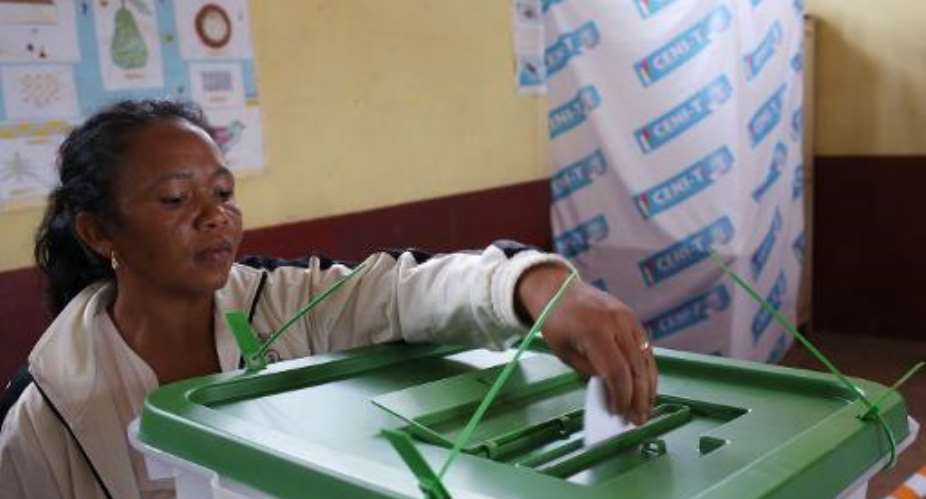Antananarivo (AFP) - Observers certified Madagascar's run-off presidential polls as free, credible and democratic on Sunday, urging bickering candidates to stay calm as counting continued after the vote to restore democracy.
"According to the parameters and methodology of the European Union, the elections were free, credible and democratic," said EU mission chief Maria Muniz de Urquiza of Friday's vote to restore democracy to the island nation.
But she cautioned that "the process has not finished. We have to wait for counting to end and the reporting of the results," after both candidates claimed victory in an ominous reminder of similar disputes during 2001 polls.
Freemason doctor Robinson Jean Louis, 66, candidate of ousted president Marc Ravalomanana, and his rival Hery Rajaonarimampianina, backed by strongman Andry Rajoelina, have also traded accusations of fraud such as stuffing ballot boxes and transporting pre-marked ballots.
The parliamentary and run-off presidential polls were aimed at pulling the island nation out of its stagnation after Rajoelina seized power from Ravalomanana in an army-backed coup in 2009.
The two foes were barred from running for the presidency as the international community fears a return to violence, but proxy candidates ran instead.
Other observers also judged the polls free and urged the candidates to accept the outcome.
Earlier Sunday the US-based Carter Center hailed the "peaceful vote" organised by a first-ever independent electoral commission.
Observers from the Carter Center and the Johannesburg-based Electoral Institute for Sustainable Democracy in Africa (EISA) found "that voting and counting processes were peaceful, orderly," they said in a statement.
The polls' organisation was "relatively successful" despite several constraints, said EISA mission head Cassam Uteem, a former president of Mauritius.
Technical, logistical and financial challenges complicated the vote during the rainy season on the world's fourth largest island.
The Carter Center also noted a "few shortcomings", such as inconsistent use of separate voters lists for the presidential and parliamentary polls and late delivery of materials.
But it stressed "these shortcomings were not systematic and will not impact the outcome of the elections."
Turnout was low -- around half the former French colony's 7.9 million eligible voters, according to the center.
Mutual mud-slinging has marked the long wait as counting continues and results trickle in.
The election commission, police and observers have so far confirmed no fraud allegations.
"All the members of our team have confirmed that everything happened transparently, and we don't have any reason to believe that there has been rigging," EISA's Uteem told AFP.
"There have been a few small irregularities which happen everywhere and aren't specific to Madagascar."
Rajaonarimampianina, 55, a former finance minister under Rajoelina, led with 53.93 percent of votes against Jean Louis's 46.07 precent, with 2,561 polling stations out of 20,001 reporting by the afternoon.
Final results are not expected before January 7, to be confirmed by the election court by February 18.
Friday's presidential run-off after an inconclusive first round on October 25 coincided with a vote for 151 parliamentarians.
The stand-off between the rivals resembles a similar squabble between Didier Ratsiraka and Ravalomanana following polls in 2001, a reminder of the Indian Ocean island's turbulent history.
Both claimed to have won the first round and each declared himself president. A court gave Ravalomanana the victory after a recount, which Ratsiraka rejected before fleeing into exile.
He returned to Madagascar in 2011 and wanted to run for president again this year, but was blocked along with Rajoelina and Ravalomanana.
"What needs to happen now is the two camps have to accept the result," one foreign observer told AFP on Saturday.





 We’ll no longer tolerate your empty, unwarranted attacks – TUC blasts Prof Adei
We’ll no longer tolerate your empty, unwarranted attacks – TUC blasts Prof Adei
 Bawumia donates GHc200,000 to support Madina fire victims
Bawumia donates GHc200,000 to support Madina fire victims
 IMF to disburse US$360million third tranche to Ghana without creditors MoU
IMF to disburse US$360million third tranche to Ghana without creditors MoU
 Truck owner share insights into train collision incident
Truck owner share insights into train collision incident
 Paramount chief of Bassare Traditional Area passes on
Paramount chief of Bassare Traditional Area passes on
 Two teachers in court over alleged illegal possession of BECE papers
Two teachers in court over alleged illegal possession of BECE papers
 Sunyani: Victim allegedly shot by traditional warriors appeals for justice
Sunyani: Victim allegedly shot by traditional warriors appeals for justice
 Mahama vows to scrap teacher licensure exams, review Free SHS policy
Mahama vows to scrap teacher licensure exams, review Free SHS policy
 Government will replace burnt Madina shops with a new three-story, 120-store fac...
Government will replace burnt Madina shops with a new three-story, 120-store fac...
